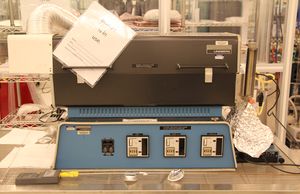Tube Furnace AlGaAs Oxidation (Lindberg): Difference between revisions
Jump to navigation
Jump to search
Content deleted Content added
Created page with "{{tool|{{PAGENAME}} |picture=Linberg.jpg |type = Thermal Processing |super= Tony Bosch |location=Bay 4 |description =? |manufacturer =? }}" |
No edit summary |
||
| (2 intermediate revisions by 2 users not shown) | |||
| Line 1: | Line 1: | ||
{{ |
{{tool2|{{PAGENAME}} |
||
|picture=Linberg.jpg |
|picture=Linberg.jpg |
||
|type = Thermal Processing |
|type = Thermal Processing |
||
|super= Tony Bosch |
|super= Tony Bosch |
||
|super2= Aidan Hopkins |
|||
|location=Bay 4 |
|location=Bay 4 |
||
|description =? |
|description =? |
||
|manufacturer =? |
|manufacturer =? |
||
}} |
}} |
||
== Description == |
|||
The Lindberg Furnace is designed for thermal oxidation of small piece parts (less than ~2" wide), under atmospheric pressure water vapor, at temperatures around 400°C. It is commonly used for VCSEL Current Aperture oxidation, via the selective oxidation of AlGaAs layers with high Aluminum content (>95%). |
|||
== Procedures == |
|||
Please ask staff for methods of performing your oxidation using this tool. |
|||
== Recipes == |
|||
Please ask staff or frequent users of the tool, for recipes and oxidation rates. Recipes are highly dependent on your epitaxy and epitaxial structure, and the specifics of the oxidation you are trying to perform. |
|||
Latest revision as of 18:13, 30 August 2022
| ||||||||||||||||||||||||||
Description
The Lindberg Furnace is designed for thermal oxidation of small piece parts (less than ~2" wide), under atmospheric pressure water vapor, at temperatures around 400°C. It is commonly used for VCSEL Current Aperture oxidation, via the selective oxidation of AlGaAs layers with high Aluminum content (>95%).
Procedures
Please ask staff for methods of performing your oxidation using this tool.
Recipes
Please ask staff or frequent users of the tool, for recipes and oxidation rates. Recipes are highly dependent on your epitaxy and epitaxial structure, and the specifics of the oxidation you are trying to perform.
